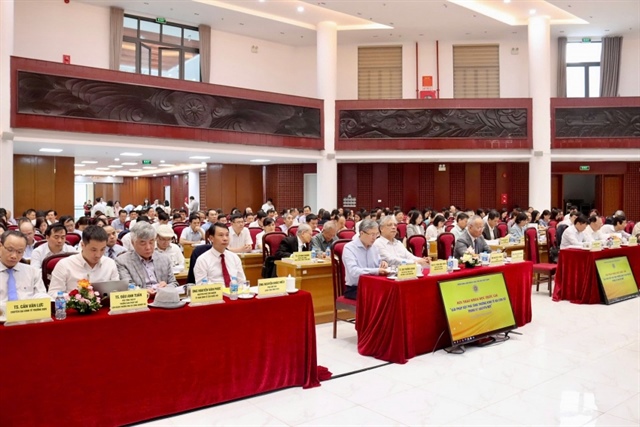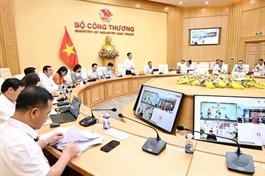Experts propose strategies to maintain Vietnam's growth trajectory
Experts propose strategies to maintain Vietnam's growth trajectory
The Vietnam Academy of Social Sciences held a national science conference on solutions for double-digit economic growth in Hanoi on May 7.
The event was attended by leaders of ministries, agencies, sectors, some localities, economists, scientists, and business representatives.
|
Participants provided scientific and practical ideas to achieve two-digit economic growth, including innovation of the growth model, institutional reform, private sector development, improving the quality of workers, digital transformation, green growth, and circular economy.
This year, the domestic economy is struggling with major challenges such as the global economic slowdown, the outbreak of protectionism, the risk of supply chain disruption, and the increasingly urgent need for digital transformation and green growth.
Dang Xuan Thanh, vice president of the Vietnam Academy of Social Sciences, said, "If the growth model and economic restructuring are not promptly innovated, Vietnam will be able to fall into the middle-income trap, requiring us to create real breakthroughs and drastic changes in development thinking and actions."
Thanh added that Vietnam's current growth model remains heavily reliant on resource exploitation and increased public investment, while the availability of cheap labour is limited. Moreover, the extensive growth model no longer meets the expectations of a dynamic and creative developing economy and reduces global competitiveness.
According to Thanh, double-digit economic growth cannot rely solely on increasing labour resources, investment, or resource exploitation, but must be associated with institutional breakthroughs.
"Therefore, Vietnam needs to build a modern, transparent, accountable institutional framework that promotes healthy competition, thereby supporting businesses to innovate and effectively draw in resources," said Thanh.
"The traditional economic spaces are being gradually depleted, and new ones, such as the digital economy, green economy, marine economy, and innovation space, are the new frontiers. This is an opportunity to identify new growth spaces, areas where Vietnam has not yet effectively exploited its potential," he added.
Moreover, the human resource factor is a soft bottleneck but is decisive in the new era. In the context of the population facing rapid ageing, Vietnam needs to build a new human resource development strategy.
Vietnam needs to establish a fair institutional foundation for private enterprises, simplify administrative procedures, remove market barriers, and increase support for research, development, market connection and protection of legal rights.
Thanh believes that while Vietnam's economy faces the challenge of huge investment demand but limited ability to mobilise domestic resources, it is necessary to diversify financial instruments, develop domestic capital markets, expand the scale and quality of the corporate bond market, develop innovation investment funds, green finance funds and effective public - private partnership capital mobilisation mechanisms.
|
At the workshop, experts all agreed that double-digit growth is a challenging goal but a prerequisite for Vietnam to realise its development strategy goals. To achieve this, there must be substantial breakthrough solutions, based on a strong foundation of institutional innovation, science and technology, and high-quality personnel.
According to Vu Thanh Tu Anh of the Fulbright School of Public Policy and Management, in addition to the private sector as the foundation for economic growth, Vietnam's economic transition to a new era rests on three fundamental pillars; state capacity, policy capacity, and a professional and proactive administrative apparatus.
"The rule of law, effective corruption control, and proper balance between state and societal power constitute the essential third pillar for Vietnam's structural economic transformation," said Anh.
Speakers at the event also discussed core issues such as recommending strong reforms of the legal framework; proposing educational reform; applying digital technology in training and human resource management; and mechanisms for effective capital mobilisation and allocation.
- 08:00 08/05/2025




























